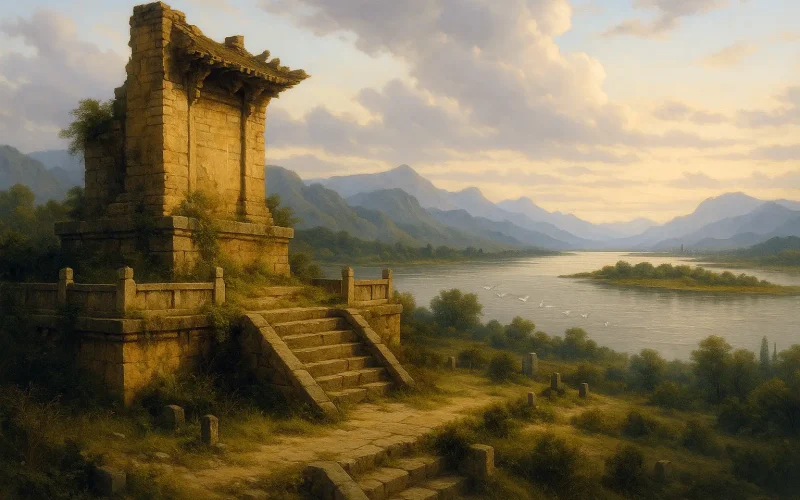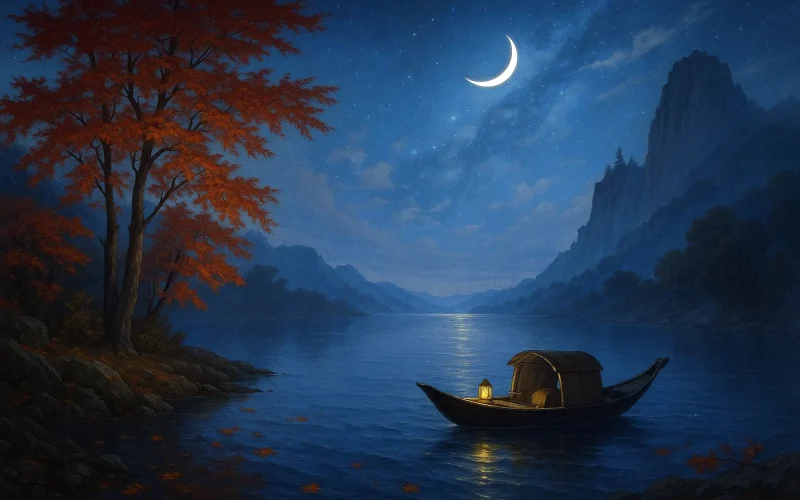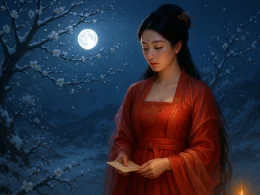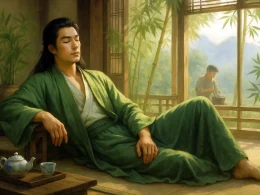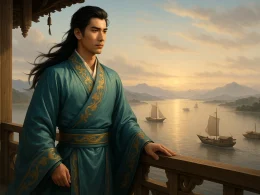Phcenixes that played here once, so that the place was named for them,
Have abandoned it now to this desolate river;
The paths of Wu Palace are crooked with weeds;
The garments of Chin are ancient dust.
...Like this green horizon halving the Three Peaks,
Like this Island of White Egrets dividing the river,
A cloud has arisen between the Light of Heaven and me,
To hide his city from my melancholy heart.
Original Poem
「登金陵凤凰台」
李白
凤凰台上凤凰游,凤去台空江自流。
吴宫花草埋幽径,晋代衣冠成古丘。
三山半落青天外,二水中分白鹭洲。
总为浮云能蔽日,长安不见使人愁。
Interpretation
This poem was written in 747 CE during Li Bai’s visit to Jinling (present-day Nanjing), where he ascended Phoenix Tower and was overcome with deep emotion. Years earlier, Li Bai had climbed Yellow Crane Tower intending to compose a poem, but after reading Cui Hao’s celebrated work “Yellow Crane Tower” inscribed there, he is said to have remarked, “Before such a view, I cannot write—Cui Hao’s poem already stands above.” This moment stayed with him, and years later at Phoenix Tower, he responded by adopting Cui Hao’s rhyme scheme to create this profound reflection. Jinling, the former capital of six dynasties, moved Li Bai to contemplate the cycles of history through its majestic landscape, while also expressing his growing concern for the state of the nation. The poem masterfully interweaves historical transformation, natural beauty, the rise and fall of empires, and personal feeling, achieving both grandeur of vision and depth of meaning.
First Couplet: “凤凰台上凤凰游,凤去台空江自流。”
Fènghuáng tái shàng fènghuáng yóu, fèng qù tái kōng jiāng zì liú.
On Phoenix Tower once phoenixes flew; Now they are gone, tower stands bare, the river flows as rivers do.
The opening lines echo the tone of Cui Hao’s “The immortal once rode the yellow crane away,” using the arrival and departure of the phoenixes to symbolize the ephemeral nature of human glory. The contrast between “once flew” and “stands bare” highlights the tension between transience and permanence. The river’s ceaseless flow underscores nature’s constancy, standing in stark contrast to the emptiness of human endeavors and establishing the poem’s meditative, historical tone.
Second Couplet: “吴宫花草埋幽径,晋代衣冠成古丘。”
Wú gōng huācǎo mái yōu jìng, Jìn dài yìguān chéng gǔ qiū.
Where Wu’s palace flowers bloomed, now quiet paths lie overgrown; Where Jin’s nobles once walked, now ancient burial mounds alone.
Here, the passage of history is made vividly tangible. “Wu’s palace” and “Jin’s nobles” represent two of the most prominent dynasties that established their capitals in Jinling, evoking the collective rise and fall of the Six Dynasties. The verbs “lie overgrown” and “now alone” are stark yet precise, depicting how splendor is reclaimed by nature and how human achievement ultimately returns to dust. The couplet’s parallel structure is exact, conveying a profound sense of historical depth.
Third Couplet: “三山半落青天外,二水中分白鹭洲。”
Sān shān bàn luò qīngtiān wài, èr shuǐ zhōng fēn báilù zhōu.
Three peaks seem to drift halfway beyond the sky’s blue dome; Two rivers part around Egret Islet, finding their separate home.
The poet’s gaze shifts from the past to the panoramic present. “Halfway beyond the sky” uses imaginative exaggeration to suggest the distant, misty mountains, creating a boundless vista; “part around” lends dynamic force to the scene, emphasizing the striking geography of Egret Islet. This couplet is a model of poetic parallelism, balancing precise observation with majestic imagery, showcasing Li Bai’s gift for depicting landscapes that are both powerful and clear.
Fourth Couplet: “总为浮云能蔽日,长安不见使人愁。”
Zǒng wèi fúyún néng bì rì, Cháng'ān bú jiàn shǐ rén chóu.
It is ever the floating clouds that obscure the sun’s bright face; Not to see Chang’an—this fills the heart with sorrow, leaving no trace.
The final couplet turns the poem’s focus sharply from history and nature to urgent contemporary concerns. “Floating clouds obscure the sun” is a classic metaphor for corrupt officials misleading the emperor; “not to see Chang’an” carries a dual meaning, referring both to physical distance and, more significantly, to political estrangement and thwarted ideals. Personal frustration merges here with anxiety for the nation’s future, creating a sorrow that is both vast and resonant.
Holistic Appreciation
This poem is widely considered the finest of Li Bai’s regulated verse (seven-character, eight-line poems), perfectly exemplifying his ability to create poetry of immense visionary power. Its structure is masterful: the opening couplet introduces the theme through allusion; the second deepens the sense of historical emptiness; the third opens into a grand, natural vista; and the final couplet brings the poem to a pointed, anxious conclusion about the poet’s own time. The emotional movement flows naturally from a meditation on vanished glories, through an appreciation of magnificent scenery, to a lament for the state of the nation, reflecting Li Bai’s characteristic blend of intense feeling and expansive perspective. In its implicit dialogue with Cui Hao’s “Yellow Crane Tower,” this work asserts its own distinct voice through its historical gravity and pointed engagement with contemporary affairs.
Artistic Merits
- A Twofold Structure of Meaning: While ostensibly a poem about a place and its history, it is deeply imbued with the poet’s concern for the political situation of his day, seamlessly blending historical reflection with personal and political expression.
- Precision and Vitality in Parallelism: The central couplets demonstrate flawless parallel structure, particularly the third, which achieves not only formal excellence but also a dynamic, sweeping depiction of the landscape within that strict form.
- Effective Use of Allusion and Metaphor: The phoenix legend and the “clouds obscuring the sun” metaphor are woven naturally into the poem, enriching its significance without becoming obscure or forced.
Insights
This work transcends the conventional “poem on a historical site.” It reveals a poet whose vision extended far beyond his own circumstances. Li Bai fused historical reflection, the beauty of the natural world, and a profound concern for his era into a unified whole. The sorrow of “not to see Chang’an” expresses not just personal disappointment but a longing for wise governance and a sense of duty toward the nation. The poem reminds us that true literary depth involves maintaining a passionate engagement with the world, even while acknowledging the transience of human affairs. It is this spirit—finding profound emotion within vast landscapes and sustaining hope amid distress—that gives his work its enduring power to move readers across the centuries.
Poem translator
Kiang Kanghu
About the poet

Li Bai (李白), 701 - 762 A.D., whose ancestral home was in Gansu, was preceded by Li Guang, a general of the Han Dynasty. Tang poetry is one of the brightest constellations in the history of Chinese literature, and one of the brightest stars is Li Bai.






